Medical School is, and always has been, extremely competitive.
These two Medical Schools have very difficult decisions to make. They have to decide who are the very best amongst a sea of excellent applicants. And their duty goes beyond simply allocating the space to the highest achievers, it’s about those who may deserve it most.
Medical Schools are selecting the doctors of the future – those who will look after the health of many generations across the course of their career, and who will rise through the ranks to, in turn, train new doctors and shape the health service of the future.
The application process has multiple steps, which helps Medical Schools gather information about applicants to help their decision making. The main components are your Personal Statement, Admissions Test and Interview. Whilst this process may seem daunting, once you learn about each step and break each down into chunks, everything becomes a lot more manageable.
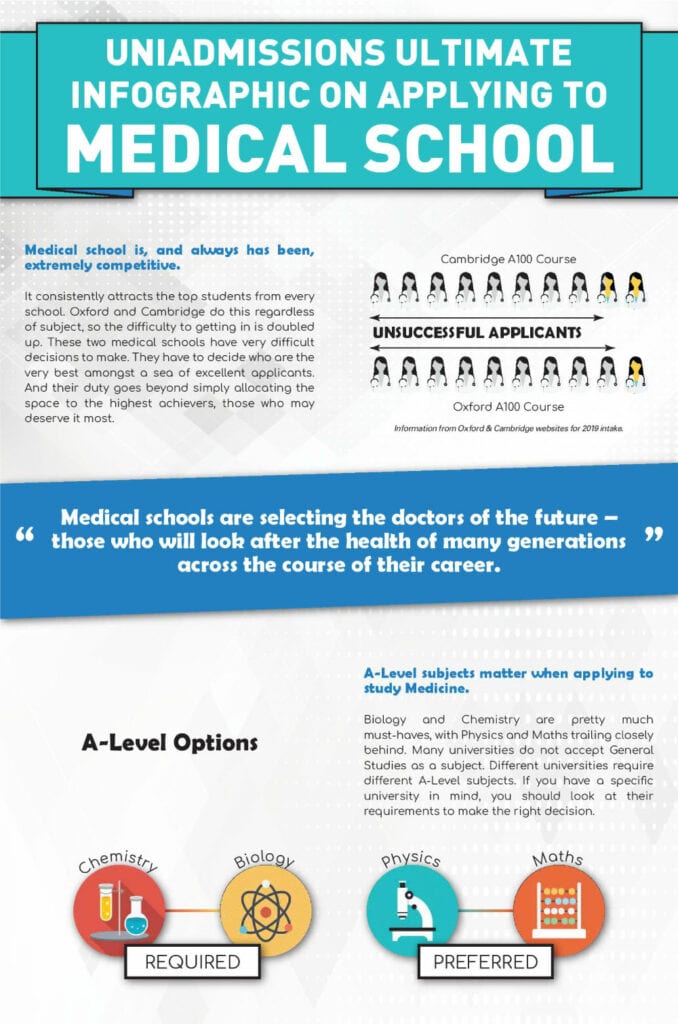
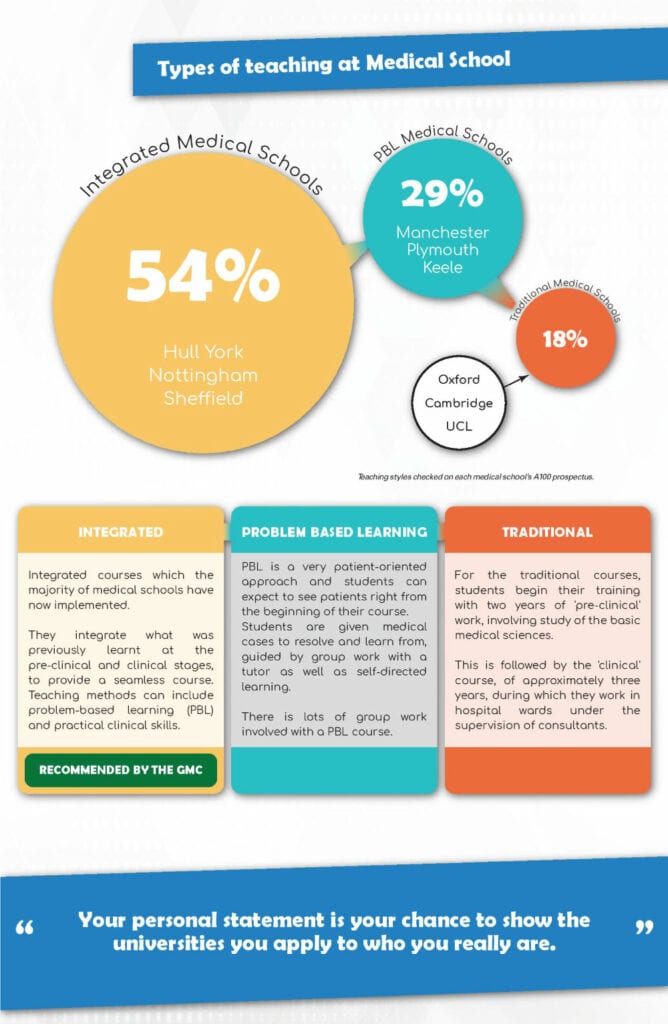
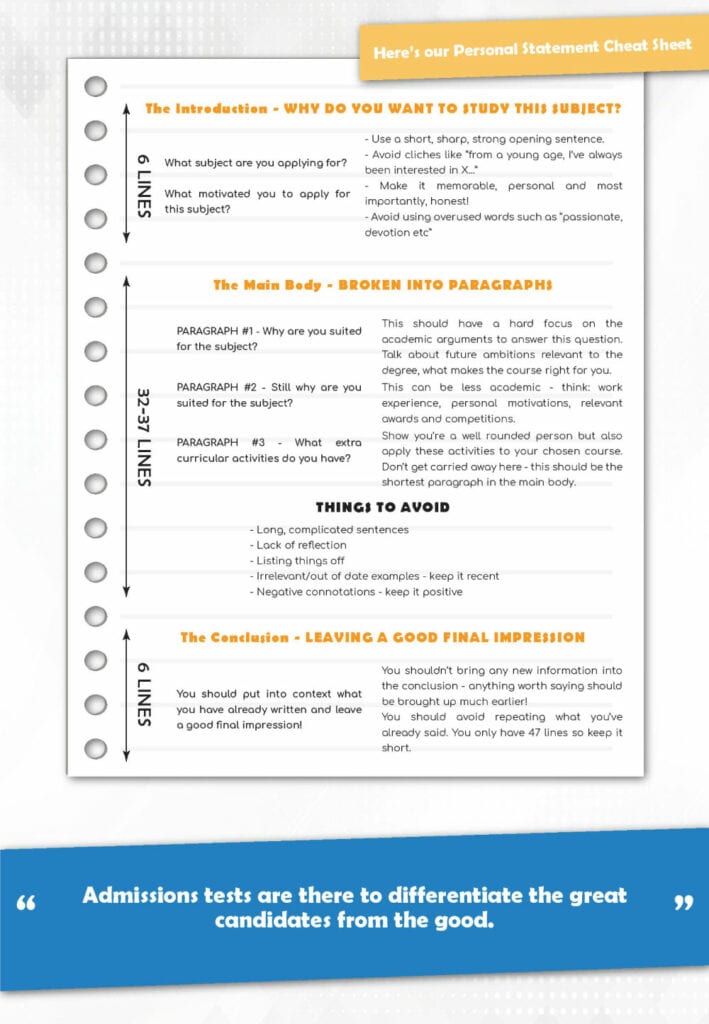
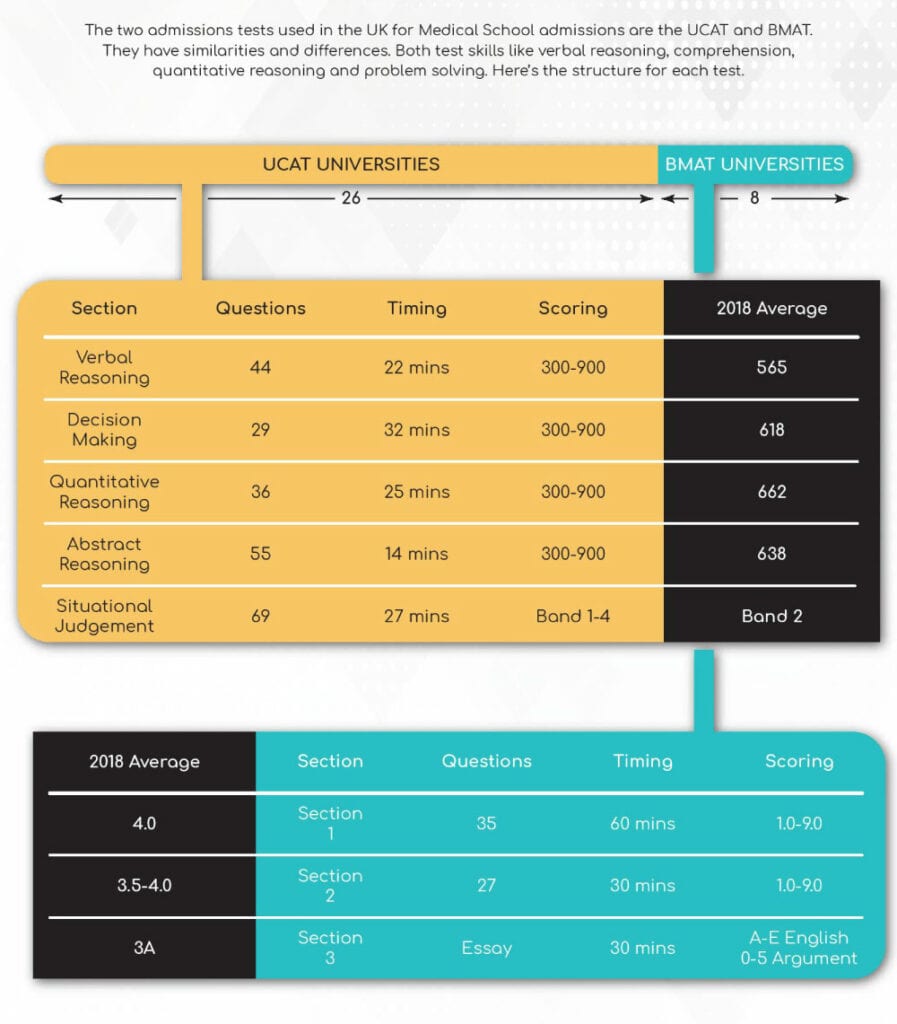
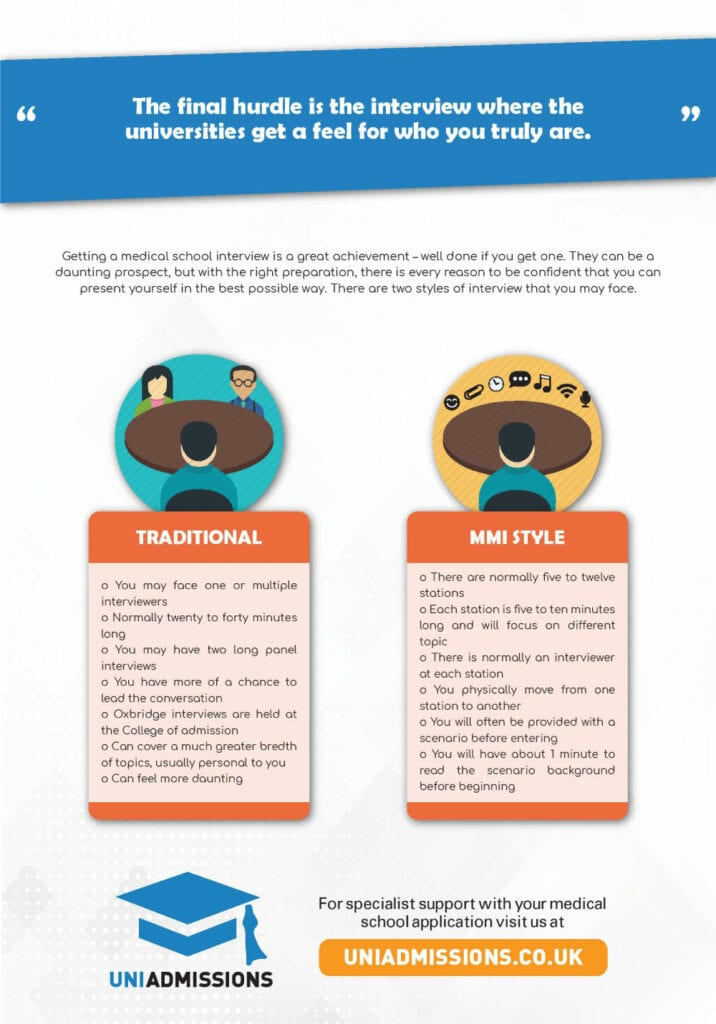
Secure your place to study Medicine at Oxbridge with the help of our expert tutors.
We help you craft the perfect Personal Statement, achieve a highly competitive BMAT and UCAT score and teach you how to Interview effectively – covering all areas of your Oxbridge Medicine application.
Discover our Oxbridge Medicine Programme by clicking the button below to enrol and triple your chances of success.
A-Level Subjects for medicine
A-Level subjects matter when applying to study Medicine. Biology and Chemistry are pretty much must-haves, with Physics and Maths trailing closely behind.
Many universities do not accept General Studies as a subject. Different universities require different A-Level subjects. If you have a specific university in mind, you should look at their requirements to make the right decision.
- Oxford: A*AA with candidates required to achieve at least a grade A in Chemistry and at least one of Biology, Physics Maths, or Further Maths.
- Cambridge: A*A*A in Chemistry and one of Biology/Physics/Maths. Most applicants have at least three science/mathematics A-Levels and some Colleges require this and/or particular subjects.
Types of teaching at medical school
One consideration to keep in mind when applying for Medical Schools is what style of teaching they use as their teaching method.
The different methods are:
- Traditional Learning
- Problem-Based Learning (PBL)
- Case-Based Learning (CBL)
- Enquiry-Based Learning (EBL)
- Intergrated
Traditional Learning
For the traditional courses, students begin their training with two years of ‘pre-clinical’ work, involving study of the basic medical sciences. This is followed by the ‘clinical’ course, of approximately three years, during which they work in hospital wards under the supervision of consultants.
Throughout the final three years they also attend lectures on all aspects of medical practice. This is a subject based course of lectures, where, for example, you would undertake anatomy, physiology, biochemistry etc., all as completely separate courses.
Almost all teaching is lecture based.
Problem-Based Learning (PBL)
PBL is a very patient-oriented approach and students can expect to see patients right from the beginning of their course.
Students are given medical cases to resolve and learn from, guided by group work with a tutor as well as self-directed learning. Group work, on top of academic and clinical learning, helps students develop communication, teamwork and problem-solving skills, personal responsibility and respect for others.
Medical schools in the UK that offer this style, include Barts and The London, Hull York, Keele, Lancaster, St George’s, University of East Anglia, University of Edinburgh, University of Exeter, University of Glasgow, University of Manchester, University of Plymouth and University of Sheffield.
Case-Based Learning (CBL)
Case-based learning uses virtual ‘trigger’ cases to stimulate interest in a particular area of the curriculum. Working in small groups over a short period, a case is used to think about the knowledge and skills needed and why these might be useful.
CBL is backed up and reinforced by a variety of interlinked learning opportunities including seminars, life sciences resources, lectures, dissection, clinical skills practice, small group learning, individual study and patient-focused learning out in the community. It is very similar to PBL.
Medical schools in the UK that offer this style, of course, include Liverpool, Cardiff and Glasgow (throughout phase three from September to February of third year).
Enquiry-Based Learning (EBL)
Enquiry-based learning starts by posing questions, problems or scenarios—rather than simply presenting established facts or portraying a smooth path to knowledge. The process is often assisted by a facilitator.
You, the student, are in charge of your own learning and at the centre of the learning experience. The emphasis is very much on your learning rather than the teacher (or lecturer) teaching. Students will identify and research issues and questions to develop their knowledge or solutions.
Integrated
Integrated courses which the majority of medical schools have now implemented integrate what was previously learnt at the pre-clinical and clinical stages, to provide a seamless course. Teaching methods can include problem-based learning (PBL) and practical clinical skills.
Integrated courses are the GMC’s recommended approach to medicine; instead of teaching anatomy and physiology etc. as separate courses, the idea is to join them into systems (also known as the systems-based approach) where you will take a bodily system, such as the circulatory system and consider the anatomy, physiology, biochemistry, pharmacology, pathology of it all at once.
The new integrated approach also encourages early patient contact and self-directed learning. Much of the teaching has a basis in lectures, supplemented with tutorials and your own self-directed work.
Your medicine personal statement
The infographic at the top of the page has all the information you need to know about your Personal Statement. Click here to read it or take a look at some of the other useful articles we have written about Personal Statements:
medicine admission tests
BMAT Exam Structure
| Number of Questions | Time Allowed | ||
|---|---|---|---|
| Section 1 | Problem Solving Requires candidates to solve problems, using simple numerical operations. Problem solving requires the capacity to: • select relevant information • identify similarity • determine and apply appropriate procedures | 16 | 60 minutes |
| Critical Thinking Presents a series of logical arguments and requires respondents to: • summarise conclusions • draw conclusions • identify assumptions • assess the impact of additional evidence • detect reasoning errors • match arguments • apply principles | 16 | ||
| Section 2 | Scientific Knowledge and Applications Biology Chemistry Physics Mathematics | 27 | 30 minutes |
| Section 3 | Writing Task | 30 minutes |
UCAT Exam Structure
| Section | Questions | Timing | Scoring |
|---|---|---|---|
| Verbal Reasoning | 44 | 21 minutes | 300-900 |
| Decision Making | 29 | 31 minutes | |
| Quantitative Reasoning | 36 | 25 minutes | |
| Abstract Reasoning | 50 | 12 minutes | |
| Situational Judgement | 69 | 26 minutes | Band 1-4 |
Medical School Interviews
Getting a Medical School Interview is a great achievement – well done if you get one! They can be a daunting prospect, but with the right preparation, there is every reason to be confident that you can present yourself in the best possible way. There are two styles of Interview that you may face.
MMI Interview
- There are normally 5 to 12 stations;
- Each station is 5 to 10 minutes long and will focus on different topic;
- There is normally an interviewer at each station;
- You physically move from one station to another;
- You will often be provided with a scenario before entering;
- You will have about 1 minute to read the scenario background before beginning;
Traditional Interview
- Multiple interviewers;
- Normally 20-40 minutes;
- May have two long panel interviews.
Oxbridge Medicine is incredibly competitive and it helps to have an edge. Our expert support will help you receive your dream offer.
With over 250 hours of guided study (including One-To-One Tuition, Mock Interviews, Intensive Courses and Comprehensive Materials), our expert Oxbridge Medicine Premium Programme truly gives you an advantage that can make the difference between an offer and rejection.
Discover our Oxbridge Medicine Premium Programme by clicking the button below to enrol and triple your chances of success.

